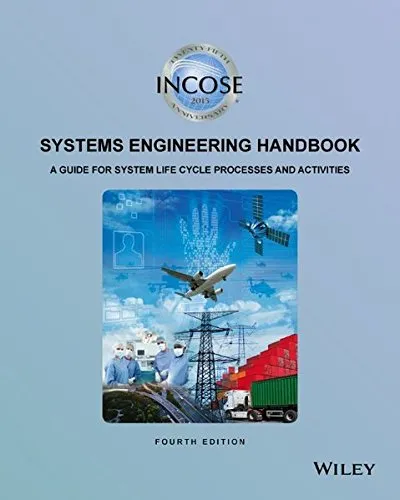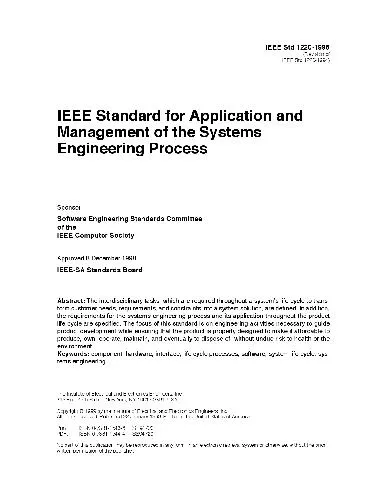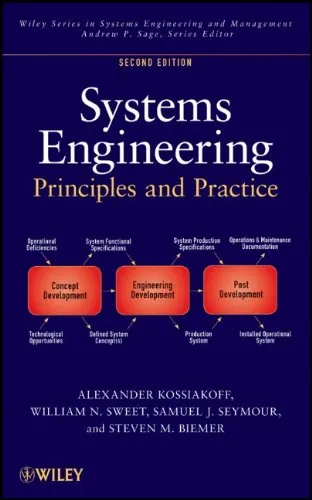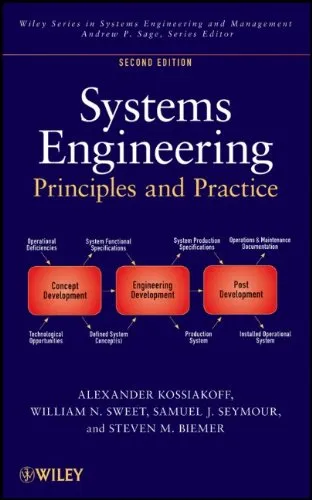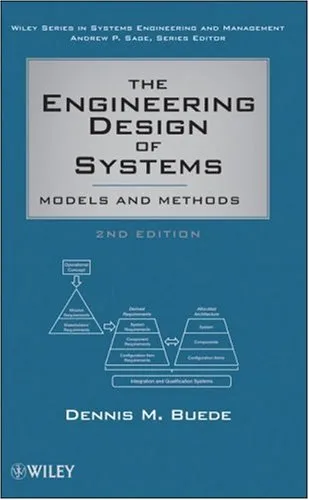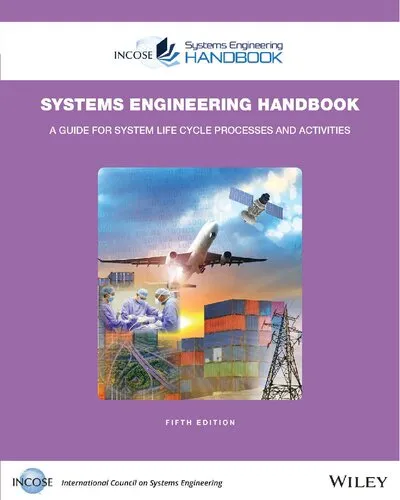INCOSE Systems Engineering Handbook: A Guide for System Life Cycle Processes and Activities
4.6
بر اساس نظر کاربران

شما میتونید سوالاتتون در باره کتاب رو از هوش مصنوعیش بعد از ورود بپرسید
هر دانلود یا پرسش از هوش مصنوعی 2 امتیاز لازم دارد، برای بدست آوردن امتیاز رایگان، به صفحه ی راهنمای امتیازات سر بزنید و یک سری کار ارزشمند انجام بدینکتاب های مرتبط:
معرفی کتاب
کتاب "INCOSE Systems Engineering Handbook: A Guide for System Life Cycle Processes and Activities" یکی از معتبرترین منابع در حوزه سیستم مهندسی است که توسط INCOSE منتشر شده است. این کتاب به عنوان یک راهنمای جامع، به تمام فرایندها و فعالیتهای موجود در چرخه حیات سیستمها میپردازد و اصول و کاربردهای مهندسی سیستمها را به شکلی علمی و جامع توضیح میدهد.
خلاصه کتاب
این کتاب با ارائه یک نمای کلی از اصول و روشهای مهندسی سیستمها آغاز میشود و به دنبال آن به بررسی دقیقتر فازهای مختلف چرخه حیات سیستمها میپردازد. بخشهای مختلف کتاب شامل فرایندهای تولید و توسعه، مدیریت پروژه، و سیستمهای پشتیبانی است که هر یک به تفصیل مورد بررسی قرار میگیرند. علاوه بر این، کتاب به طراحی معماری، تحلیل و مدلسازی سیستم و ارزیابی کارآیی سیستمها نیز میپردازد.
نکات کلیدی
- درک جامع از فرایندهای چرخه حیات سیستمها
- قابلیتهای مدیریت پروژه در زمینه سیستم مهندسی
- اهمیت تحلیل و طراحی سیستمهای پیچیده
- روشهای ارزیابی و بهبود کارآیی سیستمها
نقلقولهای معروف از کتاب
«مهندسی سیستمها علمی است که هماهنگی میان تمامی اجزا و فرایندها را به نحوی ایجاد میکند که کل سیستم به شکلی هماهنگ و بهینه عمل کند.»
«تلاش برای دستیابی به راهحلهای خلاقانه نیازمند درک عمیق از اصول و تحلیل درست سیستمها است.»
چرا این کتاب مهم است
این کتاب یک ابزار ضروری برای مهندسین سیستم، مدیران پروژه، و دانشجویان در رشتههای مرتبط است. با توجه به پیچیدگیهای روزافزون سیستمهای مهندسی، داشتن یک مرجع جامع و معتبر کمک میکند تا مهندسان بتوانند به رویکردهای استاندارد و بهترین روشها نگاهی صحیح داشته باشند. این کتاب با ارائه یک چارچوب ساختاریافته، امکان پرداختن به مسائل پیچیده سیستم و ایجاد راهحلهای نوآورانه را فراهم میسازد.
Introduction
The "INCOSE Systems Engineering Handbook: A Guide for System Life Cycle Processes and Activities" serves as an essential guide for anyone involved in systems engineering throughout the entire system life cycle. From initial concept through retirement, this comprehensive handbook provides a complete overview of systems engineering (SE) principles, practices, and methodologies. It is a valuable resource for both seasoned professionals and newcomers, offering insights into the nuances of SE and how it can be effectively applied to achieve successful system outcomes.
Detailed Summary of the Book
The handbook is structured to provide a robust understanding of systems engineering and the systems life cycle. It begins with foundational concepts, detailing the key processes involved in systems engineering, such as stakeholder needs and requirements definition, system analysis, architecture design, and implementation. It further delves into the verification and validation processes, highlighting the importance of systems integration. Each process is discussed with an emphasis on practical application, supported by examples and real-world case studies.
Moreover, the book thoroughly addresses the management aspects of SE, including risk management, configuration management, and technical leadership. It underscores the importance of interdisciplinary collaboration and provides frameworks for effectively managing complex projects. By the end of the handbook, readers will have a comprehensive understanding of the full systems life cycle process — from concept to disposal — and the critical role systems engineering plays within it.
Key Takeaways
Understanding the complete system life cycle and its critical phases.
The application of systems engineering processes to improve system performance.
Integration of technical and management processes to enhance project outcomes.
Strategies for risk management and the importance of stakeholder engagement.
Real-world applications of SE principles through case studies and practical examples.
Famous Quotes from the Book
“Systems engineering is not just about building systems. It’s about understanding and defining what those systems need to accomplish.”
“Effective collaboration and communication are the bedrock of successful systems engineering practice.”
Why This Book Matters
The importance of this handbook lies in its comprehensive coverage of systems engineering practices that are vital to the success of any engineering project. Systems engineering is depicted as an interdisciplinary approach that bridges the gap between engineering and management, making it an invaluable asset in any engineer's toolkit. This book matters because it not only provides theoretical insights but also practical guidance, making it applicable across a broad range of industries, from defense to healthcare.
By offering a detailed exploration of SE methodologies and techniques, the handbook equips systems engineers with the knowledge to address complex challenges and deliver high-quality systems. Its impact is seen in fostering a systematic approach to problem-solving and innovation, ensuring that readers are well-prepared to lead and contribute effectively to multidisciplinary projects.
دانلود رایگان مستقیم
شما میتونید سوالاتتون در باره کتاب رو از هوش مصنوعیش بعد از ورود بپرسید
دسترسی به کتابها از طریق پلتفرمهای قانونی و کتابخانههای عمومی نه تنها از حقوق نویسندگان و ناشران حمایت میکند، بلکه به پایداری فرهنگ کتابخوانی نیز کمک میرساند. پیش از دانلود، لحظهای به بررسی این گزینهها فکر کنید.
این کتاب رو در پلتفرم های دیگه ببینید
WorldCat به شما کمک میکنه تا کتاب ها رو در کتابخانه های سراسر دنیا پیدا کنید
امتیازها، نظرات تخصصی و صحبت ها درباره کتاب را در Goodreads ببینید
کتابهای کمیاب یا دست دوم را در AbeBooks پیدا کنید و بخرید
